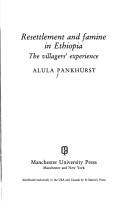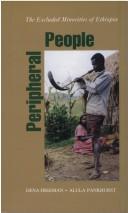| Listing 1 - 9 of 9 |
Sort by
|

ISBN: 0719035376 Year: 1992 Publisher: Manchester Manchester University Press
Abstract | Keywords | Export | Availability | Bookmark
 Loading...
Loading...Choose an application
- Reference Manager
- EndNote
- RefWorks (Direct export to RefWorks)

ISBN: 1850656576 1850656568 Year: 2003 Publisher: London Hurst
Abstract | Keywords | Export | Availability | Bookmark
 Loading...
Loading...Choose an application
- Reference Manager
- EndNote
- RefWorks (Direct export to RefWorks)
Sociology of minorities --- Ethiopia --- Minorities --- Minorités --- History. --- Histoire --- Ethiopie --- Social conditions. --- Race relations. --- Conditions sociales --- Relations raciales --- Minorités
Book
ISBN: 9781846157462 9781847016133 Year: 2009 Publisher: Suffolk Boydell & Brewer
Abstract | Keywords | Export | Availability | Bookmark
 Loading...
Loading...Choose an application
- Reference Manager
- EndNote
- RefWorks (Direct export to RefWorks)
Book
Abstract | Keywords | Export | Availability | Bookmark
 Loading...
Loading...Choose an application
- Reference Manager
- EndNote
- RefWorks (Direct export to RefWorks)
Digital
ISBN: 9781846157462 Year: 2009 Publisher: Suffolk Boydell & Brewer
Abstract | Keywords | Export | Availability | Bookmark
 Loading...
Loading...Choose an application
- Reference Manager
- EndNote
- RefWorks (Direct export to RefWorks)
Book
ISBN: 1282988247 9786612988240 1846157463 1847016138 Year: 2009 Publisher: Suffolk : Boydell & Brewer,
Abstract | Keywords | Export | Availability | Bookmark
 Loading...
Loading...Choose an application
- Reference Manager
- EndNote
- RefWorks (Direct export to RefWorks)
Development worldwide has increasingly involved displacement. Ethiopia is no exception; population displacement resulting from development as well as conflict, drought and conservation has been on the increase since the 1960s. The recent history of conflict in the Horn of Africa has led to large-scale population movements of refugees, returnees, internally displaced groups and demobilized soldiers. The context of drought and food insecurity in the mid-1980s and again in the early 2000s added a further rationale and impetus for organizing state-led resettlement programmes. This book brings together for the first time studies of the different types of development, conflict and drought induced displacement in Ethiopia, and analyses the conceptual, methodological and experiential similarities, overlaps and differences between these various forms. ALULA PANKHURST is an independent researcher and a member of the Forum for Social Studies; FRANCOIS PIGUET is a lecturer on the masters course of Advanced Studies in Humanitarian Action at the Geneva University. Published in association with the Centre Francais des Etudes Ethiopiennes (CFEE).
Migration, Internal --- Internal migration --- Mobility --- Population geography --- Internal migrants
Article
Year: 2004 Publisher: Paris : OECD Publishing,
Abstract | Keywords | Export | Availability | Bookmark
 Loading...
Loading...Choose an application
- Reference Manager
- EndNote
- RefWorks (Direct export to RefWorks)
This paper studies the development of indigenous insurance institutions set up to help cover the high costs of funerals, using evidence from rural areas in Tanzania and Ethiopia. Many of these institutions tend to co-exist within the same community and are based on well-defined rules and regulations, often offering premium-based insurance for funeral expenses, as well as, in many cases, other forms of insurance and credit to help address hardship. The paper argues that the characteristics and inclusiveness of these institutions make them well placed as models to broaden insurance provision and other development activities in these communities. In Ethiopia, there is some encouraging experience with using these institutions, as reviewed in this paper. However, the paper argues that their fragility as institutions is well illustrated by current pressures related to HIV/AIDS, as well as by their apparent resistance to engage more broadly with NGOs and government agencies. As a ...
Article
Year: 2004 Publisher: Paris : OECD Publishing,
Abstract | Keywords | Export | Availability | Bookmark
 Loading...
Loading...Choose an application
- Reference Manager
- EndNote
- RefWorks (Direct export to RefWorks)
This paper studies the development of indigenous insurance institutions set up to help cover the high costs of funerals, using evidence from rural areas in Tanzania and Ethiopia. Many of these institutions tend to co-exist within the same community and are based on well-defined rules and regulations, often offering premium-based insurance for funeral expenses, as well as, in many cases, other forms of insurance and credit to help address hardship. The paper argues that the characteristics and inclusiveness of these institutions make them well placed as models to broaden insurance provision and other development activities in these communities. In Ethiopia, there is some encouraging experience with using these institutions, as reviewed in this paper. However, the paper argues that their fragility as institutions is well illustrated by current pressures related to HIV/AIDS, as well as by their apparent resistance to engage more broadly with NGOs and government agencies. As a ...
Book

ISBN: 9994480820 2821872348 9789994480821 Year: 2016 Publisher: Addis-Abeba : Centre français des études éthiopiennes,
Abstract | Keywords | Export | Availability | Bookmark
 Loading...
Loading...Choose an application
- Reference Manager
- EndNote
- RefWorks (Direct export to RefWorks)
This book presents a timely review of the relations between the formal and customary justice systems in Ethiopia, and offers recommendations for legal reform. The book provides cases studies from all the Region of Ethiopia based on field research on the working of customary dispute resolution (CDR) institutions, their mandates, compositions, procedures and processes. The cases studies also document considerable unofficial linkages with the state judicial system, and consider the advantages as well as the limitations of customary institutions with respect to national and international law. The editor's introduction reviews the history of state law and its relations with customary law, summarises the main findings by region as well as as on inter-ethnic issues, and draws conclusions about social and legal structures, principles of organization, cultural concepts and areas, and judicial processes. The introduction also addresses the questions of inclusion and exclusion on the basis of gerontocratic power, gender, age and marginalised status, and the gradual as well as remarkable recent transformations of CDR institutions. The editor's conclusion reviews the characteristics, advantages and limitations of CDR institutions. A strong case is made for greater recognition of customary systems and better alliance with state justice, while safeguarding individual and minority rights. The editors suggest that the current context of greater decentralization opens up opportunities for practical collaboration between the systems by promoting legal pluralism and reform, thereby enhancing local level justice delivery. The editors conclude by proposing a range of options for more meaningful partnership for consideration by policy makers, the legal profession and other stakeholders. In memory of Aberra Jembere and Dinsa Lepisa. Cover: Elders at peace ceremony in Arbore, 1993.
Law --- Sociology & Anthropology --- justice --- droit --- minorités --- sociologie --- sociologie du droit --- law --- minorities --- sociology --- sociology of law
| Listing 1 - 9 of 9 |
Sort by
|

 Search
Search Feedback
Feedback About
About Help
Help News
News